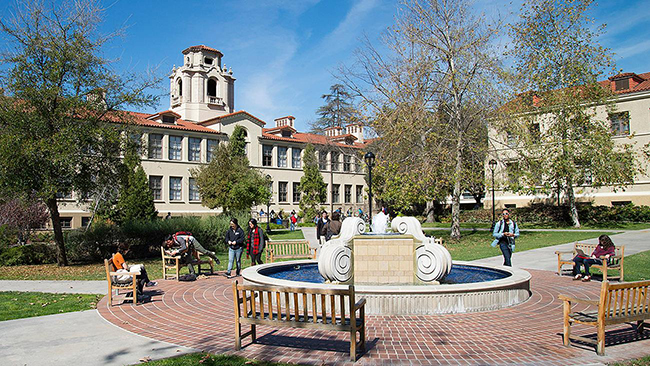Council officially takes stand against Proposition 57
The Claremont City Council took an official stance to an upcoming ballot measure during a full agenda for the last meeting in October.
Claremont Police Chief Paul Cooper presented the staff report during Tuesday’s meeting, recommending the opposition to Proposition 57, which the city says is not what it claims to be.
The proposition, proposed by Governor Jerry Brown and titled the Public Safety and Rehabilitation Act of 2016, is seen as a sweeping change to the state’s parole system and includes expanding parole and good behavior credits for non-violent offenders. It’s seen as the latest attempt to overhaul California’s overcrowded prison population.
But the real consequences of the proposition, Chief Cooper said, would be an increase in crime similar to the aftermath of Proposition 47, which was passed by voters in 2014. Under one provision of Prop 57, Chief Cooper said, felons would be eligible for release only after the end date of their primary offense.
“Felons who have committed multiple crimes against multiple victims will be eligible for release at the same time as inmates who committed one crime against one victim,” Chief Cooper said.
The result would be an immediate negative impact to cities like Claremont, which has seen a noticeable uptick in property crimes in the past year, Chief Cooper said.
The council was in agreement, noting that while reform is needed in the prison system, Prop 57 is not the way to go.
Councilmember Opanyi Nasiali noted that Prop 57 would “exacerbate the situation” reportedly created by Prop 47. “When the citizens passed Prop 47, we didn’t realize what we were getting ourselves into,” Mr. Nasiali said.
Councilmember Corey Calaycay pointed out that he usually wasn’t comfortable with voting on a resolution such as this one, saying he did not want to “put the citizens of Claremont on record” by voting for or against a proposition.
This time, however, he made an exception, noting he had been fielding phone calls from residents about residential burglaries and citing the need for people to be aware of the ramifications of such a ballot measure.
“I do feel it’s important, at least from an educational perspective, to bring awareness to this issue,” Mr. Calaycay said.
The resolution passed unanimously, 5-0
Organic recycling program
The council also unanimously agreed to create an organic food waste recycling program, which would allow businesses to enter into a program to recycle and compost their organic and food waste that they had previously discarded.
The program is in direct response to AB 1826, which was passed in 2015 and requires mandatory commercial organic recycling throughout California.
According to Director of Community Services Roger Bradley, “organics” can include food waste materials, landscape debris and food-soiled paper products, paper plates, napkins or coffee grounds.
After getting the directive from the city council on March 22, the city held workshops with commercial owners to determine the best way to deal with organic waste. A consensus was reached on a city-run food waste collection program, which was also determined to be the least-expensive option, the staff report said.
“Basically what it requires is that businesses that generate food waste material or organic matter, that they arrange for recycling that material,” Mr. Bradley said, noting that the material gets sent to a composting facility and then recycled into the soil.
Interested businesses will receive an additional 64-gallon bin to collect the organic material, which would be serviced by city employees on Monday, Wednesday, Friday and Saturday.
While the city must report business compliance to the state every year, there are no current penalties for those who don’t comply, Mr. Bradley said.
The overall cost of the program is $104,400 for 2016-2017 and $149,800 for 2017-2018, which includes material processing costs, disposal costs and staffing—Claremont would be hiring a full-time solid waste operator to oversee the program.
In addition, a five percent increase in commercial trash rates will be necessary over the next two years to cover the costs, according to the staff report.
The city would need to enter into an agreement with a local processing facility to accept the material, however, and that process continues. After fielding bids from companies such as Burrtec ($74.47 per ton of waste) and Grand Central Recycling & Transfer Station ($90 per ton), the city believes it can hold out longer for better bids.
Councilmember Joe Lyons asked Mr. Bradley if there were any local composting options, and Mr. Bradley responded he had met with Sustainable Claremont over the past few months to “create a potentially small-scale compost facility in the community.”
Freeman Allen presented an additional option during public comment, stating that several compost plots—each about a half-acre—could be created for compost sites to grow urban agriculture, similar to the Growing Club in Pomona.
“We could use this valuable material to actually bolster the income from the process while avoiding the expenses to pay to have it processed elsewhere,” Mr. Allen said.
The council reacted positively to the idea, and asked about potential options for such an operation. Mr. Bradley noted that several sites, such as the Rancho Santa Ana Botanic Garden, could be considered.
The council unanimously approved the resolutions, 5-0.
The council also approved resolutions calling for a municipal election on March 7, 2017 and approving regulations for candidates looking to run for local office. Items on the ballot for March include two city council openings.
The COURIER will have more on the council meeting in next week’s edition. The next city council meeting will take place on November 8.
—Matthew Bramlett
news@claremont-courier.com










0 Comments